Serving 815 students in grades Kindergarten-6, John S. Wash Elementary School ranks in the top 30% of all schools in California for overall test scores (math proficiency is top 30%, and reading proficiency is top 30%).
The percentage of students achieving proficiency in math is 46% (which is higher than the California state average of 33%). The percentage of students achieving proficiency in reading/language arts is 59% (which is higher than the California state average of 47%).
The student:teacher ratio of 24:1 is higher than the California state level of 21:1.
Minority enrollment is 89% of the student body (majority Hispanic), which is higher than the California state average of 80% (majority Hispanic).
Quick Stats (2025)
- Grades: Kindergarten-6
- Enrollment: 815 students
- Student:Teacher Ratio: 24:1
- Minority Enrollment: 89%
- Overall Testing Rank: Top 30% in CA
- Math Proficiency: 46% (Top 30%)
- Reading Proficiency: 59% (Top 30%)
- Science Proficiency: 30-34% (Top 50%)
- Source: National Center for Education Statistics (NCES), CA Dept. of Education
Top Rankings
John S. Wash Elementary School ranks among the top 20% of public schools in California for:
Category
Attribute
Diversity
School Overview
John S. Wash Elementary School's student population of 815 students has grown by 22% over five school years.
The teacher population of 34 teachers has grown by 25% over five school years.
Grades Offered
Grades Kindergarten-6
Total Students
815 students
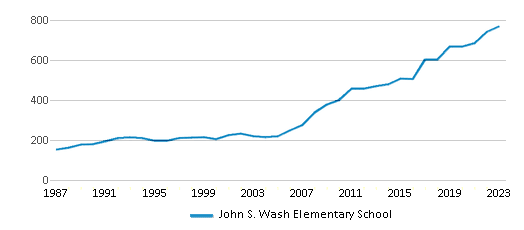
Gender %
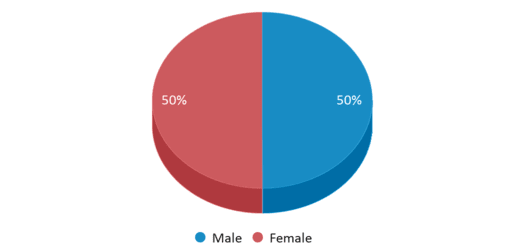
Total Classroom Teachers
34 teachers
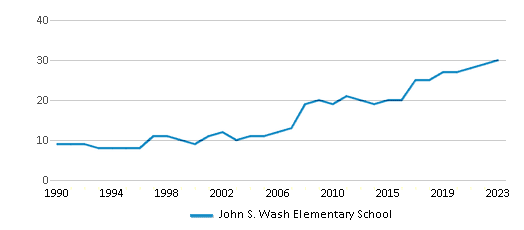
Students by Grade
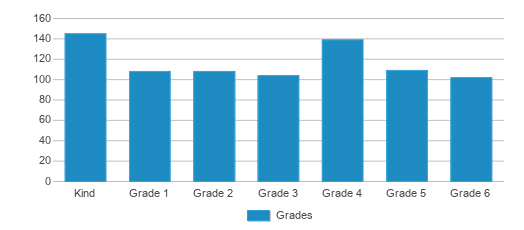
School Rankings
John S. Wash Elementary School ranks within the top 30% of all 9,602 schools in California (based off of combined math and reading proficiency testing data).
The diversity score of John S. Wash Elementary School is 0.67, which is more than the diversity score at state average of 0.63. The school's diversity has stayed relatively flat over five school years.
Overall Testing Rank
#2282 out of 9602 schools
(Top 30%)
(Top 30%)
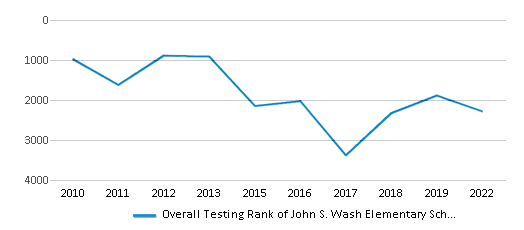
Math Test Scores (% Proficient)
46%
33%
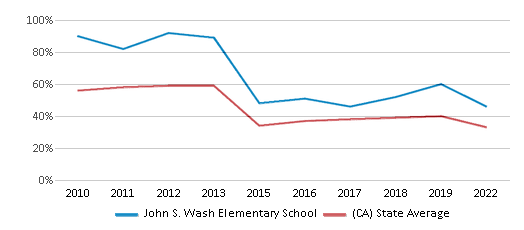
Reading/Language Arts Test Scores (% Proficient)
59%
47%
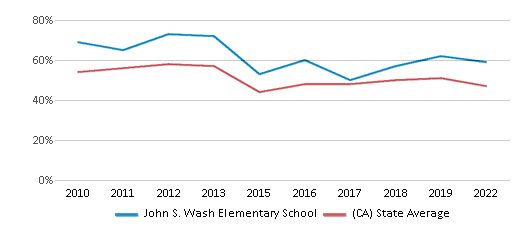
Science Test Scores (% Proficient)
30-34%
29%
Student : Teacher Ratio
24:1
21:1
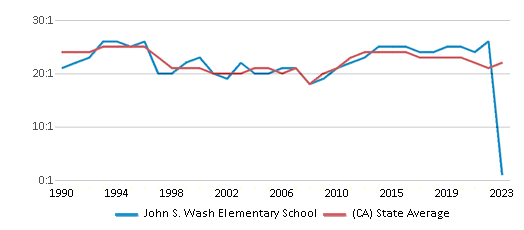
American Indian
n/a
1%
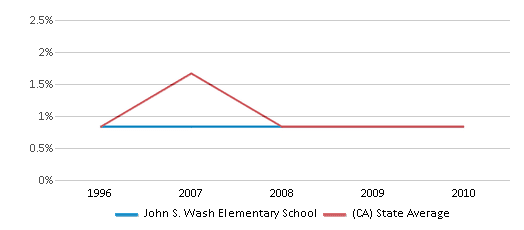
Asian
32%
12%
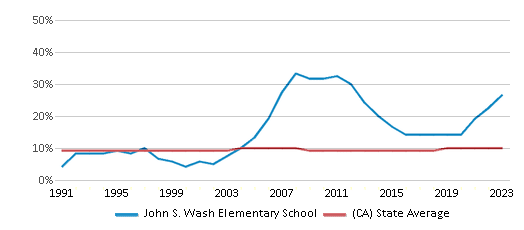
Hispanic
46%
56%
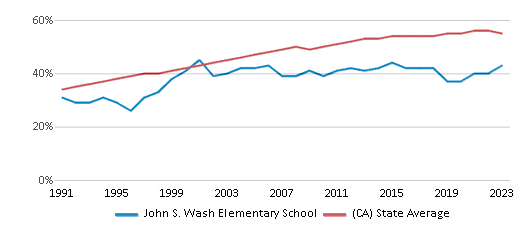
Black
3%
5%
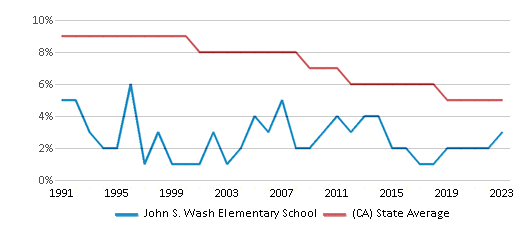
White
11%
20%
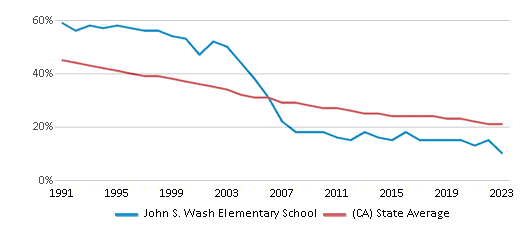
Hawaiian
n/a
n/a
Two or more races
8%
6%
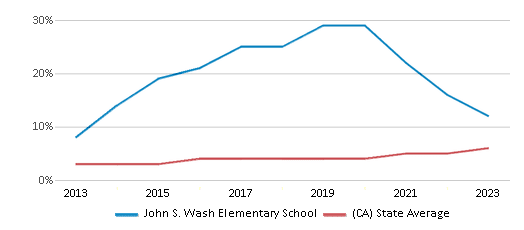
All Ethnic Groups
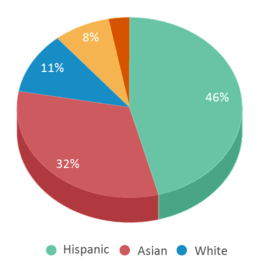
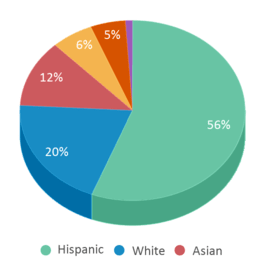
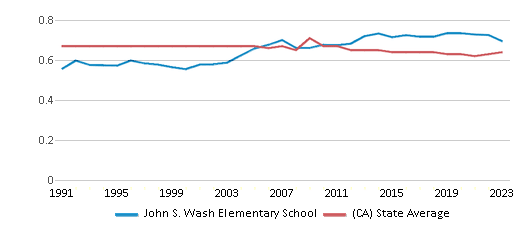
Eligible for Free Lunch
38%
54%
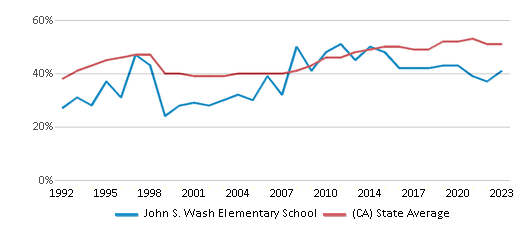
Eligible for Reduced Lunch
22%
8%
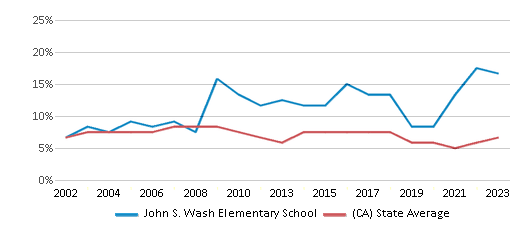
School Statewide Testing
School District Name
Source: National Center for Education Statistics (NCES), CA Dept. of Education
Profile last updated: 02/09/2025
Frequently Asked Questions
What is John S. Wash Elementary School's ranking?
John S. Wash Elementary School is ranked #2282 out of 9,602 schools, which ranks it among the top 30% of public schools in California.
What schools are John S. Wash Elementary School often compared to?
John S. Wash Elementary Schoolis often viewed alongside schools like Sequoia Elementary School by visitors of our site.
What percent of students have achieved state testing proficiency in math and reading?
46% of students have achieved math proficiency (compared to the 33% CA state average), while 59% of students have achieved reading proficiency (compared to the 47% CA state average).
How many students attend John S. Wash Elementary School?
815 students attend John S. Wash Elementary School.
What is the racial composition of the student body?
46% of John S. Wash Elementary School students are Hispanic, 32% of students are Asian, 11% of students are White, 8% of students are Two or more races, and 3% of students are Black.
What is the student:teacher ratio of John S. Wash Elementary School?
John S. Wash Elementary School has a student ration of 24:1, which is higher than the California state average of 21:1.
What grades does John S. Wash Elementary School offer ?
John S. Wash Elementary School offers enrollment in grades Kindergarten-6
What school district is John S. Wash Elementary School part of?
John S. Wash Elementary School is part of Sanger Unified School District.
In what neighborhood is John S. Wash Elementary School located?
John S. Wash Elementary School is located in the Roosevelt neighborhood of Fresno, CA. There are 32 other public schools located in Roosevelt.
School Reviews
1 5/17/2021
Awful school. Pe teachers made my class run in a square, and if we slowed down, they'd add a minute, I almost died. Thanks school: |, glad I not in that school anymore.
5 1/22/2021
I seriously love this school! It's the best way to teach kindness and kids, I am very happy to go to John wash!
5 3/17/2020
I think John Wash is a great place. I know I'm just a 2nd grader, but John Wash is the best place. It may be my opinion you don't have to agree with me though. John Wash is a really hard working school! My teacher Mrs. Barton is the best, she teaches us a lot of things! Learning is amazing. John Wash is a place where you meet kind, funny nice friends around the blacktop/playground! John wash deserves it for being a really hard working school! Second Grader Faith Room 14 Teacher Stacey-Souza Barton..
Review John S. Wash Elementary School. Reviews should be a few sentences in length. Please include any comments on:
- Quality of academic programs, teachers, and facilities
- Availability of music, art, sports and other extracurricular activities
Recent Articles

What Is A Charter School?
Explore the world of charter schools in this comprehensive guide. Learn about their history, how they operate, and the pros and cons of this educational innovation. Discover key facts about charter schools, including admission policies, demographics, and funding, as well as what to look for when considering a charter school for your child.

10 Reasons Why High School Sports Benefit Students
Discover the 10 compelling reasons why high school sports are beneficial for students. This comprehensive article explores how athletics enhance academic performance, foster personal growth, and develop crucial life skills. From improved fitness and time management to leadership development and community representation, learn why participating in high school sports can be a game-changer for students' overall success and well-being.

February 05, 2025
Understanding the U.S. Department of Education: Structure, Impact, and EvolutionWe explore how the Department of Education shapes American education, from its cabinet-level leadership to its impact on millions of students, written for general audiences seeking clarity on this vital institution.





